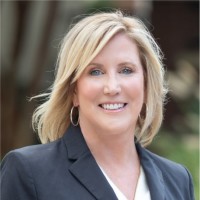The first thing to know about Mary Ahern Snyder is this: “I have a lack of risk aversion.”
She credits that lack of aversion to her dad, who she dubs a serial entrepreneur. It’s a trait that led her to start her own business and to continue to expand its services and footprint. Founded in 2014, Significance supports federal organizations across a range of services, from financial management and audit support to emerging technology and cybersecurity.
The Annapolis, Maryland, company began by mainly helping Defense Department organizations achieve audit readiness. It still largely serves a DoD clientele, but today its team numbers roughly 100 employees and its 2022 revenue will close in on $30 million. In fact, Inc. named Significance No. 1073 on its 2022 list of the 5,000 fastest growing private companies in the U.S.
Snyder talked with Rich Brady, CEO of the American Society of Military Comptrollers, about how she has grown the business for ASMC‘s The Business of Defense podcast on Federal News Network. She shared six lessons learned that she attributes to her company’s continued growth and success.
“We listened to our customers, and we tried to stay ahead of what the market was doing. We were kind of looking around the corner … and working with our customers to plan ahead so that they were not caught flat-footed.”
Mary Ahern-Snyder
President and Founder
No. 1: Relationships matter, even in government contracting
Although Snyder likes to say that she’s not a “prior,” meaning she has no government experience on her resume nor any time at the big accounting firms, she did realize early on that working with federal agencies is relationship-driven.
“Getting great people in and having them work together well, and then being trustworthy and transparent with your employees, your partners and your government clients, and then sharing the success with everybody else seems to be the key,” Snyder said.
Keeping those few things top of mind has really helped the business grow every year since founding, she said.
No. 2: Yes, you have to bring in great expertise
“We try to bring in the best expertise we can,” Snyder said. “I know that sounds like a cliché, but between that and the relationships we’re able to provide solutions to our government clients.”
Admittedly, it is tough to compete for talent against some big federal contractors on pay and signing bonuses. It’s one reason that she hired a chief people and culture officer — long before 2020. “We sell our culture and the promise of being empowered,” Snyder said.
No. 3: Speaking of culture, hire people who are “cultural adds”
The culture of the business does matter, and when hiring employees it’s about more than if someone is the right fit, she said.
If everyone just fits, then the business can become too “cookie cutter — you’re all the same,” Snyder said. The “adds” bring dimension and diversity, and, perhaps most important, a fresh perspective to the work and the team, she said.
Development of a Customer Base
“We look for people that are cultural ‘adds,’ not ‘the fit.’ Because the fit is like the cookie cutter — you’re all the same. ... When somebody has a diverse background, they can add such a different perspective to our culture.”
Mary Ahern-Snyder
President and Founder
No. 4: Let your customers POV help create your growth roadmap
When moving forward and planning what was to come next, Snyder’s lack of risk aversion came in handy because she kept expanding into new areas of business. But she said the company did so based on paying close heed to its customers, where they wanted to go and new initiatives that were on their horizon.
“We listened to our customers, and we tried to stay ahead of what the market was doing,” Snyder said. “We were kind of looking around the corner … and working with our customers to plan ahead so that they were not caught flat-footed.”
No. 5: Have mentors, be a mentor and continue to foster those relationships
Throughout her career, even before launching Significance, Snyder looked to other women business leaders for advice. She still has relationships with many of these women, including Sara Starry, founder and president of the 37-year-old Starry Associates.
“She’s obviously ridiculously large at this point but very open to giving me advice and communicating with me what her thoughts are,” Snyder said.
There’s nothing to lose by helping others, she said, adding that it doesn’t detract from one’s own successes.
No. 6: In defense contracting, embrace that it’s a man’s world (for now)
With most of its customers in the Navy, Marine Corps and DoD, the people that Significance works for and with are predominantly men, Snyder said. But the defense realm is changing, she added. When she looks at Significance’s roster of DoD customers today, there are so many more women than when the company began.
But even if it’s a male-dominated business environment, that shouldn’t dissuade a woman-owned federal contractor from entering the defense space, Snyder said. She advises other women entrepreneurs to celebrate the little wins and continue to believe in themselves and their businesses.
“Eventually, you’re going to look back and go, ‘Oh my gosh, I’m a legitimate company.’ ”
To listen to the full discussion between Mary Ahern Snyder, president and founder of Significance, and Rich Brady, CEO at the American Society of Military Comptrollers, click the podcast play button below:
Discover other The Business of Defense podcasts here.
Copyright
© 2025 Federal News Network. All rights reserved. This website is not intended for users located within the European Economic Area.






